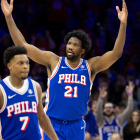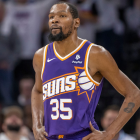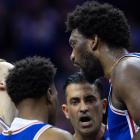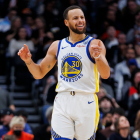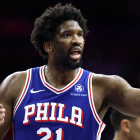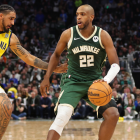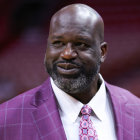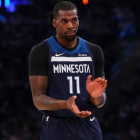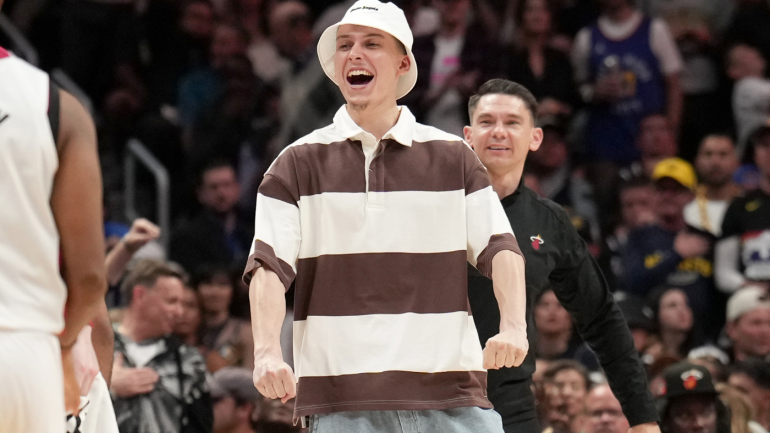
Tyler Herro dived for a loose ball with about a minute left in the first half of the Miami Heat's first game of the first round. He took a while to get up, and, when he did, he initially ran off the floor to the locker room. When he realized the Heat were in the middle of an offensive possession, he stationed himself in the corner, grabbing at his right hand and wincing in pain. When Gabe Vincent passed him the ball anyway, he took the open shot but missed it horribly.
Herro stayed on the floor for the remainder of the half, then was done for the game and, in all likelihood, the season. The Heat announced that he'd fractured his right hand. They won the series opener, but, by the time they announced that he'd undergone surgery and was expected to miss a minimum of six weeks, the No. 1-seeded Milwaukee Bucks had tied the series 1-1 with franchise player Giannis Antetokounmpo sitting out Game 2.
Tyler Herro is seemingly in a lot of pain in his right hand after diving after a loose ball... pic.twitter.com/4uAQxVcJN8
— Bally Sports Sun: HEAT (@BallyHEAT) April 16, 2023
Miami had finished the season 44-38, with a negative point differential and the 25th-best offense in the NBA. Herro averaged 20.1 points on 56.6% true shooting, and his 25% usage rate was slightly higher than Jimmy Butler's. The Heat needed his shotmaking -- he made 36.9% of his pull-up 3s on good volume -- and they needed his two-man game with Bam Adebayo, it seemed. Losing him looked like a blow to their already slim chances against Milwaukee.
Then the Heat blew out the Bucks in Game 3, with Duncan Robinson, who didn't play a single second in the first half of Game 1, scoring 20 points in 23 minutes. They won Game 4, too, with Butler scoring 56 points and Caleb Martin making a couple of clutch jumpers. In Game 5, Butler dropped 42 and they pulled off a come-from-behind, overtime victory, with Vincent adding 22 and Kevin Love shooting 5-for-11 from deep, stunning the Bucks the same way they did in the 2020 bubble.
And now, like the bubble, Miami is in the NBA Finals, having dispatched of the New York Knicks and upset the No. 2-seeded Boston Celtics. Last Friday marked six weeks since Herro had surgery, and multiple reports before the start of the series indicated he was aiming to return for Wednesday's Game 3 against the Nuggets, if not earlier. Given how the Heat have gotten here, though, and the strengths of their Finals opponent, they are in the tricky position of evaluating how much the presence of their starting shooting guard -- and the relatively recent recipient of a four-year, $120 million contract -- will help and how much it will hurt.
This is not necessarily Tom-and-Shiv-in-the-limo awkward, but it's awkward. Herro's absence not only forced Butler to take on more usage and made room for Martin, Vincent, Robinson and Max Strus to get comfortable on offense, but it also allowed Miami's coaching staff to balance the rotation. By taking a high-minutes, offense-only player out of the picture entirely, the Heat went from an above-average defensive team to an elite one. During his end-of-season press conference last Thursday, Celtics president Brad Stevens said that his team "had trouble getting by that first line of defense with all the helping hands and activity" and that the ball pressure forced Boston to initiate its offense later than it wanted to and get stagnant late in games.
Could Herro's scoring be valuable against the Denver Nuggets? Sure, as long as he's capable of jumping right into the most intense environment imaginable less than two months after breaking his shooting hand. If there was a single legitimate reason to be skeptical of the Nuggets' title chances as they piled up regular-season wins, it was that they might run into a team that can spread them out in the playoffs. Even with Jamal Murray and Michael Porter Jr. healthy and Kentavious Caldwell-Pope and Bruce Brown on the roster, they are theoretically vulnerable against offenses like last year's Golden State Warriors and the previous year's Phoenix Suns, who both mixed pristine spacing with pinpoint passing and pull-up shooting. Herro's two-man game with Adebayo could be a real problem.
On the surface, Miami's 104-93 loss in Game 1 suggested that Herro is perfectly positioned to play hero. The Heat scored a paltry 100 points per 100 possessions, and, according to Cleaning The Glass, managed just 93.3 per 100 in the halfcourt. Butler scored 13 points on 14 shots and didn't attempt a free throw. It was their least efficient game of the playoffs, and, since Denver was also extremely inefficient by its standards, one could conclude that Miami can afford to sacrifice some defense for buckets.
Despite the numbers, though, I came away from the opener much more concerned about the Heat's defense than their offense. They looked tiny compared to the Nuggets, and Nikola Jokic was not bothered in the least by their fronting or double-teaming. Miami largely got good shots out of its dribble-handoff stuff, Kyle Lowry made three pull-up 3s and both teams missed plenty of wide-open looks. Sunday's Game 2, in which the Heat scored 129.1 points per 100 possessions and Denver scored 124.1 per 100, lends further support to the idea that Miami is just fine offensively and needs some help on the other end.
On Monday, ESPN's Ros Gold-Onwude tweeted that Herro is still dealing with soreness and swelling, is concerned about messing with Miami's rhythm and wants to make sure the time is right before returning. Shortly thereafter, the Miami Herald's Anthony Chiang tweeted that Herro has some hurdles to clear before he can play, citing a source saying the expectation that he'll be back in the Finals is a bit overstated.

CBS Sports HQ Newsletter
Your Ultimate Guide to Every Day in Sports
We bring sports news that matters to your inbox, to help you stay informed and get a winning edge.
Thanks for signing up!
Keep an eye on your inbox.
Sorry!
There was an error processing your subscription.
If Herro can play and there is a place for him in this series, expect Erik Spoelstra to find it. With Haywood Highsmith making all sorts of winning plays, though, and Robinson doing fourth-quarter damage from deep and off the dribble, there isn't an obvious candidate to cut out of the rotation. As soon as Herro steps on the floor, he is going to be challenged defensively, and not in the same way that other teams do it. Against Denver, it's not just about showing and recovering when your man sets a ball screen; it's about navigating off-ball screens and being in constant communication.
Maybe Miami can cover for Herro defensively by playing more zone. The Heat did in the fourth quarter with Jokic on the floor in Games 1 and 2, and both times it disrupted the Nuggets' rhythm. A Miami optimist could point to this as evidence that, as long as it is intentional about the way it attacks Denver, it can mask defensive weaknesses. A skeptic could warn that, after giving the Nuggets all of these zone possessions to study, this scheme might not be viable much longer. When you give Denver a look at something exploitable, it usually makes you pay.














